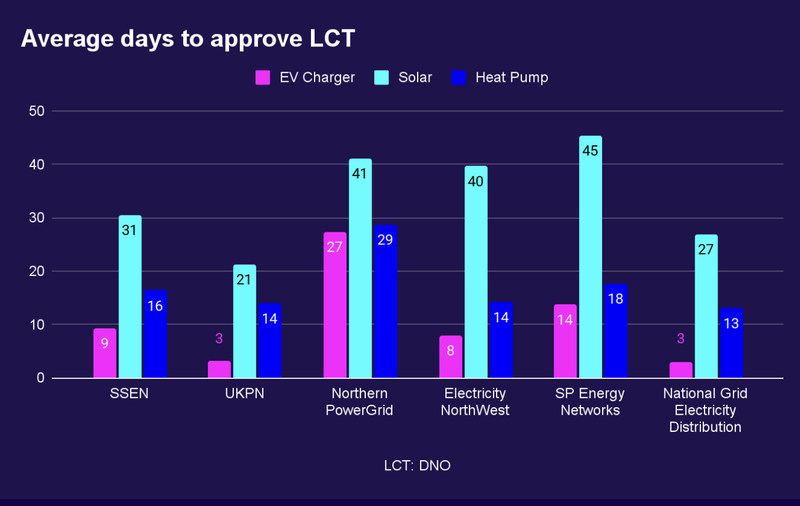DNO leaderboard: who is fastest to approve new low carbon tech?
The background
Thousands of customers around the UK are choosing electric vehicles, solar panels and heat pumps to help reduce energy costs and carbon emissions. Yet customers can sometimes face significant delays before an installation at their home is possible. What’s more, the amount of time they have to wait will vary depending on where they live.
This postcode lottery of delays is caused by the complex and inconsistent processes used by the Distribution Network Operators (DNOS), who currently have to approve all installations.
As customer demand for these technologies begins to grow exponentially, we want to work with DNOs, policy makers and wider industry to tackle this issue and help provide customers with the best experience possible.
To help achieve this, we’re sharing our data on DNO performance on install approval delays…
Fastest to approve new low carbon technologies
| 🏆 | Distribution Network Operator | Av. approval time |
|---|---|---|
| 1st | UKPN | 7 |
| 2nd | National Grid Electricity Distribution | 8 |
| 3rd | Electricity NorthWest | 12 |
| 4th | SSEN | 14 |
| 5th | SP Energy Networks | 16 |
| 6th | Northern PowerGrid | 32 |
Our data shows that customers in the worst performing DNO are having to wait on average over 1 month for their approval to install low carbon tech in their home. These delays don’t apply to fossil fueled options - we think this needs to change. This is an important challenge, but there are plenty of solutions.
A closer look at the data...
| 🏆 | Distribution Network Operator | % approvals in 1 day |
|---|---|---|
| 1st | UKPN | 67% |
| 2nd | National Grid Electricity Distribution | 60% |
| 3rd | SSEN | 24% |
| 4th | Electricity NorthWest | 16% |
| 5th | Northern PowerGrid | 7% |
| 6th | SP Energy Networks | 2% |
Average days to approve by LCT

This report uses Octopus installation data, which is entered and updated manually. As a result, it may differ from DNO internal logs. We would welcome the wider publication of LCT connection data by DNOs to be collated and tracked by Ofgem.
Priority actions for DNOs
We've identified 5 priorities for DNOs to speed up approvals for low carbon tech (LCT):
Maximise the use of auto-approvals
DNOs can and do immediately approve LCT connections if they meet certain criteria. To help installers, DNOs should immediately publish these criteria on which can connect and where without works required.
Set a clear deadline for approval timings
Approvals currently have no deadline attached. This needs to change, with clear minimum standards to help give customers more confidence in the process. Equally, all technologies require a simple, streamlined process for submitting applications through ENA’s Direct Connect.
Update engineering assumptions
There are several ways that DNOs can change their methodologies for faster approvals, such as:
- Using actual data to set demand thresholds: Today many DNOs use theoretical maximum demand assumptions that don’t reflect reality and these can be updated with real customer data.
- Increase solar ‘G98’ thresholds: DNOs will automatically approve solar installs below 3.68kW, but this threshold can be increased. UKPN already has a 5kW limit and has sector leading performance on solar installs.
- Proactive voltage management: our data shows an average voltage level of 243V across the UK, which adds costs to consumers and makes it more difficult to connect LCTs such as solar. DNOs must adopt proactive strategies to optimise levels across their areas and enable more connections. Statutory voltage limits should also be reviewed to be inline with EU standards of 230V +/-10%.
Enable flexible solutions to mitigate risk
Some DNOs already promote load limiting devices or flexible technologies to approve LCTs more quickly. These creative solutions should be maximised and best practice followed across the sector. Allow third parties to carry out essential works
Allow third parties to carry out essential works
Collaborating with and allowing third parties to carry out works, such fuse upgrades, can cut installation times by minimising the number of house visits required. UKPN and NGED already allow Octopus to carry out fuse upgrades for customers, significantly reducing install delays.
Published on 9th April 2025 by:
Hey I'm Constantine, welcome to Octopus Energy!
×Close window

